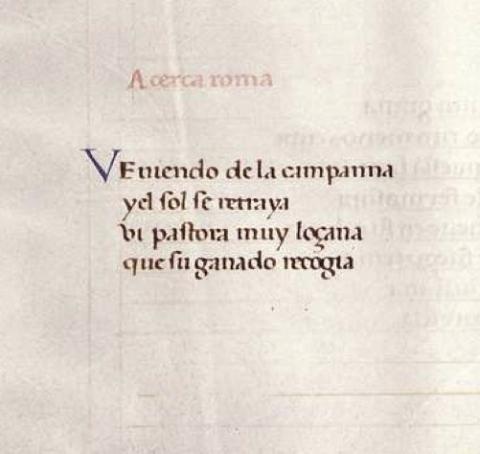"As I came from Campagna" | "Veniendo de la Campanna"
Introduction to the Text
This poem is a serranilla, an evolution of the Provençal pastorela. Written in short verse (arte menor), serranillas narrate a courtly poet’s encounter with a mountain woman. This is one of six compositions in the genre by fifteenth-century author Carvajal (or Carvajales). Very little is known about Carvajal’s life. His poetry is linked to the court of Alfonso the Magnanimous in Naples (r. 1442-1458) and to that of Alfonso’s son Ferrante (r. 1459-1494). In addition to his famous serranillas, Carvajal is also known for his literary epistles and ballads.
In this poem, the poet meets a peasant whose gentle appearance, modesty, and simple life are described in detail and praised.
Introduction to the Source
The poem is copied in Madrid, Biblioteca Nacional de España, VITR/17/7, fol. 154r-155r. This manuscript is a copy of the poetry collection known as the Cancionero de Estúñiga, ca. 1465. It has been digitized: http://bdh-rd.bne.es/viewer.vm?id=0000051837. It contains a compilation of mostly Castilian poems, including ballads, as well as a few Italian compositions. Their authors attended the King of Aragon, Alfonso the Magnanimous, in Naples in the mid-fifteenth century.
About this Edition
The text has been punctuated. Word separation and capitalization follow modern usage. Elisions have been marked with an apostrophe.
Further Reading
Carvajal. Poesie, edited by Emma Scoles. Edizioni dell’Ateneo, 1967.
- Critical edition of Carvajal’s poetry.
Gerli, E. Michael. “The Libro in the Cancioneros.” Reading, Performing, and Imagining the ‘Libro del Arcipreste’. U of North Carolina P, 2016. esp. pp. 194-203.
- Reassessment of Caravajal’s serranas in view of their intertextual relationship with the Libro de buen amor.
Marino, Nancy F. La serranilla española: notes para su historia e interpretación. Scripta Humanistica, 1987.
- Study of the serranilla genre, with attention to Carvajal’s poems in chapter 5.
Credits
Transcription by Marco LobascioTranslation by Marco LobascioIntroduction by Albert LloretEncoded in TEI P5 XML by Danny SmithSuggested citation: Carvajal. ""As I came from Campagna"." Trans. Marco Lobascio. Global Medieval Sourcebook. http://sourcebook.stanford.edu/text/i-came-campagna. Retrieved on April 25, 2024.

